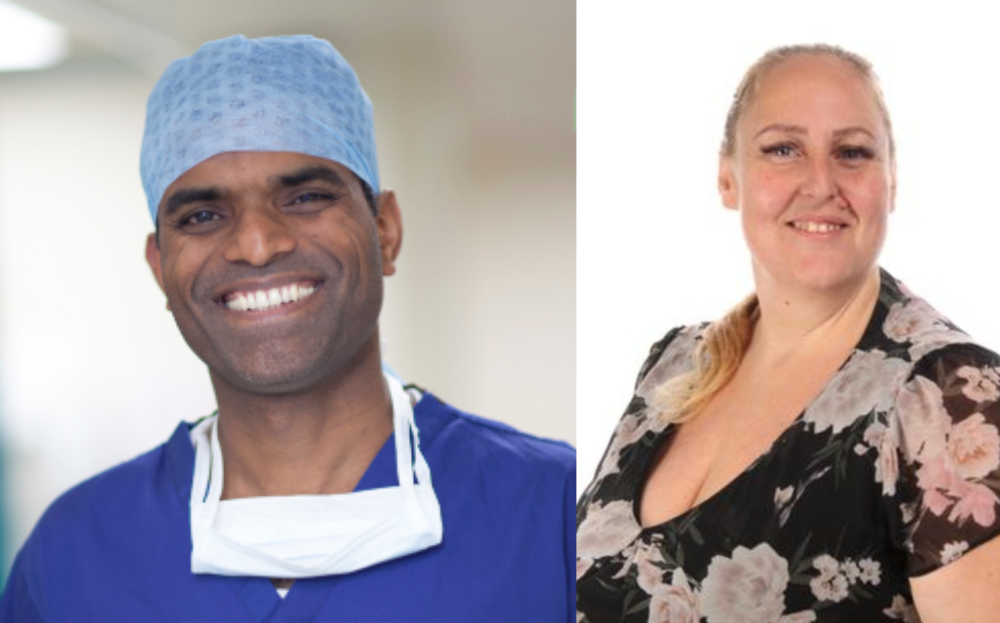
A breakthrough procedure to treat women suffering with severe symptoms from fibroids is now available at Royal Free London NHS Foundation Trust (RFL).
The Sonata treatment combines ultrasound imaging with radiofrequency energy to gradually reduce the size of these non-cancerous growths in the womb.
Known as transcervical fibroid ablation, the procedure does not involve removing the womb, or making any incisions.
Clinical studies have shown that it is effective, with 96% of women saying their symptoms improved within a year.
It is possible to perform the procedure under a local anaesthetic, but in some cases a general anaesthetic may be given. Studies have shown that patients recover more quickly than they do following invasive surgery, such as hysterectomy, to treat fibroids. So far, on average, women who have had Sonata Treatment have been able to return to normal activities within two days, and half of them were able to do so within 24 hours.
Around two in every three women will develop fibroids during their lifetime, and many will not experience any signs they have them. But for those who do, symptoms may include heavy and painful periods, bloating and constipation, frequent need to urinate, and pain during sex.
Fibroids usually develop when women are between the ages of around 16 to 50, and are thought to be linked to the hormone oestrogen. The symptoms may be relieved by medication but if this does not help, other treatment options may be recommended.
Mr Mahantesh Karoshi, consultant obstetrician and gynaecologist (pictured above), carried out RFL’s first Sonata Treatment at Chase Farm Hospital. It is available in around 16 other NHS hospitals across Britain; RFL was one of the first trusts in London to offer it.
Mr Karoshi explains: “Sonata is hugely beneficial for women who want to conserve their uterus, with a faster return to normal activity compared to surgical interventions. With a hysterectomy, the womb is removed. With a myomectomy, the uterus is preserved but there is a much longer recovery time.
“Sonata has been clinically proven to be safe and effective, and for the patients who are deemed suitable to have it under a local rather than a general anaesthetic, recovery times are even faster.”
Caroline Mansi (pictured above), a primary school teacher in her early 40s, was the first patient to have Sonata Treatment at RFL. Three months later, she says: “I have got my life back”.
She explains how for the previous three to four years, her professional and personal life had been seriously affected by fibroids: “I had horrendous, heavy and painful periods and nothing seemed to help. It was completely unpredictable, so I might be fine for days then suddenly have very heavy bleeding.
“It was particularly difficult as a teacher to need to leave the room frequently. I had to ask for my classroom to always be opposite the toilets, so the geography of the school had to be adapted for me. Sometimes I would even need to go home and shower. I was lucky that I have an understanding and supportive employer, but it was still very embarrassing.
“I could never go swimming, and my sex life was affected. I was anaemic so I had to take iron tablets which didn’t agree with me, and I felt constantly run down.”
Caroline, who lives in Enfield, was referred by her GP to the gynaecology department at RFL. Following a delay due to the pandemic, she was given an appointment. She recalls: “From the moment I met Mr Karoshi, I felt validated and heard; he was so understanding.”
For clinical reasons, Mr Karoshi advised that surgery was not the best option for Caroline.
She continues: “He suggested seeing if Sonata Treatment was suitable for me. I had an MRI scan, and he discussed my case with a team of different experts, and I was told I was a good candidate for the new procedure. I was given the option of having a local anaesthetic and I thought it would be much better than having a general if I didn’t need it.”
Caroline says she was glad to be awake and able to ask questions during the procedure. “Mr Karoshi kept explaining to me what was happening, and I felt in control – knowledge is power after all.
“I was able to move around the next day and was back to work two days later. I only had mild cramps after the procedure, which compared to the periods I have been having for years felt like nothing. I was able to move around next day.
“Since then, I have only had occasional slight spotting. I don’t need to constantly carry spare clothes or sanitary products around with me. I can go swimming. It has changed my life – I had got so used to the way things were; I felt I had to put up and shut up, and now I just appreciate having a normal life so much.
“I could not recommend Sonata highly enough.”
Facts
Sonata Treatment is an appropriate option for many women who have fibroids and are suffering with heavy periods that last more than seven days and affect their work or normal activities.
More than 4,000 Sonata treatments have been carried out around the world; about 250 of which have been in the UK.
Clinical trials show that 95% of women had a reduction in bleeding within 12 months of the procedure, and half of them returned to normal activities the next day.
If you think you may have fibroids, ask your GP for advice and they may refer you to hospital for investigation or treatment.
 Translate
Translate
